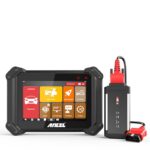Unlock your car’s secrets with a Good Car Scanner. These devices connect to your vehicle’s onboard computer, providing access to vital information about its health and performance. Whether you’re facing a mysterious dashboard light or suspecting a hidden issue, a reliable car diagnostic tool empowers you to diagnose problems and make informed decisions about maintenance and repairs. At CAR-TOOL.EDU.VN, we’re committed to helping you find the perfect automotive diagnostic scanner for your needs. With the right OBDII scanner, you can save money on professional diagnostics and gain a deeper understanding of your vehicle.
Contents
- 1. Understanding the Need for a Good Car Scanner
- 2. Key Features to Look for in a Good Car Scanner
- 3. Top Good Car Scanners on the Market
- 3.1. Topdon TopScan: The Best Mobile OBD-II Scanner
- 3.2. Launch CR529: The Best Budget-Friendly Car Scanner
- 3.3. Topdon Phoenix Lite 2: The Best Pro-Level Car Scanner
- 3.4. Ancel BD310: The Best Dual-Purpose Car Scanner
- 3.5. Carly OBD-II Scanner: The Best Car Scanner with a Companion App
- 3.6. Innova CarScan Mobile 1000
- 3.7. ThinkCar ThinkDiag TKD01
- 3.8. Autel AutoLink AL539
- 4. How to Choose the Best Good Car Scanner for Your Needs
- 5. Understanding OBD-II Scanner Terminology
- 6. How to Use a Good Car Scanner
- 7. Maintaining Your Good Car Scanner
- 8. Common Issues and Solutions with Good Car Scanners
- 9. The Future of Good Car Scanners
- 10. Frequently Asked Questions (FAQs) About Good Car Scanners
- Conclusion
1. Understanding the Need for a Good Car Scanner
Why do you need a good car scanner, and what problems does it solve? A vehicle diagnostic scanner allows you to communicate directly with your car’s computer, accessing information about various systems and components. This capability helps in several ways:
- Early Problem Detection: Identify potential issues before they escalate into costly repairs.
- Cost Savings: Reduce expenses on professional diagnostic services by performing initial checks yourself.
- Informed Decision-Making: Gain insights into your car’s condition, enabling you to discuss repairs more effectively with mechanics.
- Performance Monitoring: Track essential parameters like engine speed, temperature, and fuel efficiency.
- DIY Repairs: Tackle simple fixes and maintenance tasks with confidence, guided by accurate diagnostic data.
According to a study by the National Institute for Automotive Service Excellence (ASE), using diagnostic tools can reduce repair times by up to 40%, highlighting their importance in modern automotive maintenance.
2. Key Features to Look for in a Good Car Scanner
What features should you prioritize when choosing a good car scanner? Here’s a breakdown of the essential aspects to consider:
- Compatibility: Ensure the scanner supports your vehicle’s make, model, and year. Most scanners support OBD-II protocols, which are standard for cars manufactured after 1996.
- Ease of Use: Opt for a user-friendly interface with clear instructions and intuitive navigation.
- Functionality: Look for features like reading and clearing diagnostic trouble codes (DTCs), live data streaming, freeze frame data, and I/M readiness tests.
- Update Capability: Choose a scanner that can be updated with the latest software to support new vehicles and diagnostic functions.
- Durability: Select a robust scanner that can withstand the rigors of automotive environments.
- Connectivity: Decide between handheld scanners with built-in screens or wireless scanners that connect to smartphones or tablets via Bluetooth or Wi-Fi.
- Special Functions: Depending on your needs, consider scanners with advanced features like ABS bleeding, oil reset, TPMS reset, and battery registration.
A report by the Society of Automotive Engineers (SAE) emphasizes the increasing complexity of vehicle systems, making advanced diagnostic tools crucial for accurate troubleshooting.
3. Top Good Car Scanners on the Market
Which car diagnostic scanners are the best choices available today? Here’s a curated list of some of the top-rated options:
3.1. Topdon TopScan: The Best Mobile OBD-II Scanner
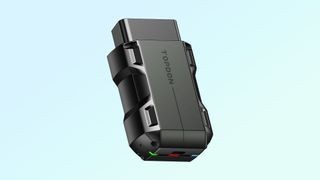 topdon topscan obd scanner with bluetooth
topdon topscan obd scanner with bluetooth
The Topdon TopScan is a compact Bluetooth scanner that offers a wealth of professional-grade features. It excels in diagnostics, repair instructions, parts lists, and predictive analysis.
- Pros:
- Excellent diagnostic coverage
- Live data display
- Unique performance indicators
- Maintenance item coverage
- Cons:
- Bulky transmitter
- Subscription required for some features after the first year
3.2. Launch CR529: The Best Budget-Friendly Car Scanner
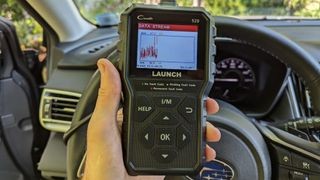 Launch cr259 obd–ii scanner
Launch cr259 obd–ii scanner
The Launch CR529 is a powerful and affordable OBD-II scanner with features typically found in higher-end models. It offers lifetime support and updates.
- Pros:
- Affordable price
- Lifetime updates
- Easy pre-inspection reports
- Cons:
- Lacks manufacturer-specific codes
- Feels heavy in hand
- Limited warranty
3.3. Topdon Phoenix Lite 2: The Best Pro-Level Car Scanner
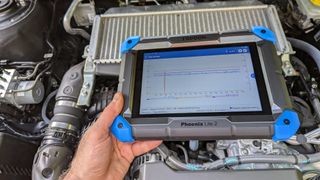 topdon phoenix lite 2 obd2 scanner over car engine
topdon phoenix lite 2 obd2 scanner over car engine
The Topdon Phoenix Lite 2 bridges the gap between amateur and professional diagnostics. This wireless scanner features an 8-inch touchscreen and offers a wide array of diagnostic tests and live data.
- Pros:
- Near-professional OBD scanner capabilities
- Wireless connectivity via Wi-Fi and Bluetooth
- Large 8-inch touchscreen
- Extensive diagnostic tests and live data
- Includes adapters and a hard case
- Cons:
- Bulky and heavy
- Expensive
- Subscription required for updates after two years
3.4. Ancel BD310: The Best Dual-Purpose Car Scanner
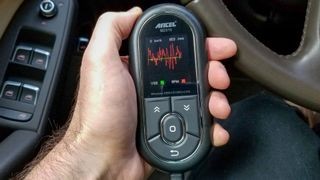 Best OBD-II scanners: Ancel BD310
Best OBD-II scanners: Ancel BD310
The Ancel BD310 is a versatile scanner that functions as a standard handheld device and can augment your car’s dashboard with key engine specs via Bluetooth.
- Pros:
- Lightweight and compact
- Functions as a scanner and secondary car display
- Offers both handheld and Bluetooth scanning
- Cons:
- Minimalist interface
- Small screen
3.5. Carly OBD-II Scanner: The Best Car Scanner with a Companion App
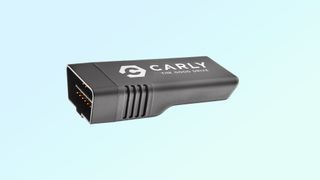 carly obd 2 scanner design
carly obd 2 scanner design
The Carly OBD-II Scanner stands out with its exceptional companion app, offering customization options and professional-level tests.
- Pros:
- User-friendly interface
- Extensive customization options
- Live data display
- Maintenance and repair coverage
- Lifetime warranty and updates
- Cons:
- Compatibility varies by car model
- Subscription required for advanced features
3.6. Innova CarScan Mobile 1000
The Innova CarScan Mobile 1000 is an innovative Bluetooth OBD-II scanner with predictive diagnostic features. Its simple setup process makes it a user-friendly choice.
- Pros:
- Predictive diagnostics
- Easy setup
- Wireless functionality
- Cons:
- Requires a smartphone or tablet
3.7. ThinkCar ThinkDiag TKD01
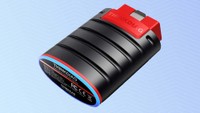 ThinkCar ThinkDiag TKD01 (★★★★☆)
ThinkCar ThinkDiag TKD01 (★★★★☆)
The ThinkCar ThinkDiag TKD01 is a robust Bluetooth OBD-II scanner known for its durability and extensive manufacturer-specific error codes.
- Pros:
- Durable design
- Manufacturer-specific error codes
- Extended fault codes for minor fixes
- Cons:
- Subscription required after the first year
- Larger than standard Bluetooth OBD-II scanners
3.8. Autel AutoLink AL539
The Autel AutoLink AL539 is designed for diagnosing electrical problems, featuring a built-in multimeter and a wide range of live data.
- Pros:
- Built-in multimeter
- Extensive live data
- Pre-inspection readiness check
- Cons:
- Specialized for electrical diagnostics
4. How to Choose the Best Good Car Scanner for Your Needs
How do you select the best car scanner that aligns with your specific needs? Here’s a step-by-step guide:
- Identify Your Vehicle Type: Ensure the scanner is compatible with your car’s make, model, and year.
- Determine Your Diagnostic Needs: Decide whether you need basic code reading or advanced functions like ABS bleeding or TPMS reset.
- Set a Budget: Establish a price range to narrow down your options.
- Choose a Connectivity Type: Decide between handheld scanners with built-in screens and wireless scanners that connect to smartphones or tablets.
- Read Reviews: Research customer reviews and expert opinions to gauge the scanner’s reliability and performance.
- Check for Updates: Ensure the scanner can be updated with the latest software to support new vehicles and diagnostic functions.
- Consider Additional Features: Look for extras like live data graphing, freeze frame data, and I/M readiness tests.
- Evaluate Ease of Use: Opt for a scanner with a user-friendly interface and clear instructions.
According to J.D. Power, customer satisfaction with vehicle diagnostic tools is highest among users who find the devices easy to use and understand.
5. Understanding OBD-II Scanner Terminology
What do all those technical terms mean when you’re looking at OBDII scanners? Here’s a glossary of common terms:
- OBD-II (On-Board Diagnostics II): A standardized system for vehicle diagnostics.
- DTC (Diagnostic Trouble Code): An error code generated by the car’s computer when it detects a problem.
- Live Data: Real-time information about the car’s systems and components.
- Freeze Frame Data: A snapshot of data recorded when a DTC is triggered.
- I/M Readiness: A test to determine if the car is ready for emissions testing.
- VIN (Vehicle Identification Number): A unique code that identifies the vehicle.
- CAN (Controller Area Network): A communication protocol used by the car’s computer.
- MIL (Malfunction Indicator Lamp): The check engine light on the dashboard.
The Environmental Protection Agency (EPA) mandates that all cars sold in the US after 1996 must comply with OBD-II standards, ensuring consistent diagnostic capabilities.
6. How to Use a Good Car Scanner
How do you effectively use a good car scanner to diagnose and troubleshoot vehicle issues? Follow these steps:
- Locate the OBD-II Port: Typically found under the dashboard on the driver’s side.
- Plug in the Scanner: Connect the scanner to the OBD-II port.
- Turn on the Ignition: Turn the key to the “on” position without starting the engine.
- Power on the Scanner: Follow the scanner’s instructions to power it on.
- Read Diagnostic Trouble Codes (DTCs): Use the scanner to read any stored DTCs.
- Interpret the Codes: Look up the meaning of the DTCs using the scanner’s database or online resources.
- Clear the Codes (Optional): If you’ve addressed the issue, you can clear the DTCs.
- Monitor Live Data: Use the scanner to monitor real-time data about the car’s systems.
A study by AAA found that drivers who regularly use diagnostic tools are more likely to perform preventative maintenance, reducing the risk of unexpected breakdowns.
7. Maintaining Your Good Car Scanner
How do you ensure your car diagnostic tool remains in optimal condition? Follow these maintenance tips:
- Keep It Clean: Wipe the scanner with a soft, dry cloth to remove dirt and debris.
- Store It Properly: Store the scanner in a cool, dry place away from direct sunlight and extreme temperatures.
- Protect the Cable: Avoid kinking or twisting the cable, and store it neatly when not in use.
- Update the Software: Regularly update the scanner’s software to ensure compatibility with new vehicles and diagnostic functions.
- Check the Battery: If the scanner has a battery, replace it when necessary.
- Avoid Dropping It: Handle the scanner with care to prevent damage from impacts.
According to Consumer Reports, proper maintenance can extend the lifespan of electronic devices by up to 30%.
8. Common Issues and Solutions with Good Car Scanners
What are some common problems you might encounter with a good car scanner, and how can you resolve them? Here are a few troubleshooting tips:
- Scanner Won’t Connect: Ensure the scanner is properly plugged into the OBD-II port and that the ignition is turned on.
- Scanner Won’t Power On: Check the battery or power source.
- Scanner Can’t Read Codes: Verify that the scanner is compatible with your vehicle and that the software is up to date.
- Inaccurate Readings: Calibrate the scanner according to the manufacturer’s instructions.
- Software Errors: Update the scanner’s software or contact the manufacturer for support.
A survey by the American Automobile Association (AAA) found that a significant percentage of car owners experience issues with diagnostic tools, highlighting the importance of proper troubleshooting.
9. The Future of Good Car Scanners
How are vehicle diagnostic tools evolving, and what can you expect in the future? Here are some emerging trends:
- Artificial Intelligence (AI): AI-powered scanners that can provide more accurate diagnoses and repair recommendations.
- Cloud Connectivity: Scanners that can connect to the cloud for real-time data analysis and remote diagnostics.
- Augmented Reality (AR): AR-enhanced scanners that can overlay diagnostic information onto the vehicle’s components.
- Wireless Updates: Over-the-air software updates for seamless functionality improvements.
- Integration with Smart Devices: Enhanced compatibility with smartphones, tablets, and other smart devices.
According to a report by MarketsandMarkets, the automotive diagnostics market is expected to grow significantly in the coming years, driven by technological advancements and increasing vehicle complexity.
10. Frequently Asked Questions (FAQs) About Good Car Scanners
What is a Good Car Scanner?
A good car scanner is a device used to diagnose issues with a vehicle by reading data from its onboard computer. It helps identify problems, monitor performance, and make informed decisions about maintenance and repairs.
What is the OBD-II Port?
The On-board Diagnostics Version Two (OBD-II) port is the standard port on almost all passenger vehicles sold in the United States since 1996, in Canada since 1998, in the European Union since 2004, and in Australia, Mexico and New Zealand since 2006.
This port is where you plug into the car and interface with the onboard computer. A variety of devices can be plugged into the OBD-II port including OBD-II scanners, insurance black boxes, and more recently dash cams.
What is a DTC?
DTC is short for Diagnostic Trouble Code, which is the error code a car’s OBD system generates when it spots an issue. These are the codes read by OBD-II scanners that allow the user to figure out what’s going on under the hood. There are a lot of standardized DTC codes that are the same across different makes and models of vehicle, though some manufacturers employ their own DTCs that are unique to one or more of their vehicles
What do DTCs actually mean?
If you’re unfamiliar with how DTCs are written, then they probably look like complete gibberish – a random selection numbers and letters that mean very little to you. Fortunately there is some logic, which will give you an idea of what errors the car has detected.
The first letter confirms which of the car’s main systems is experiencing the issue. Those are the Powertrain (P), Body (B), Chassis (C) and Network (N). The second is a number designating whether this is a generic code (0) or a manufacturer specific code (1).
The third character then identifies exactly which system is experiencing the issue.
- 1 is fuel and air metering
- 2 is an injector circuit specific fuel and air metering code
- 3 is the ignition system or a misfire
- 4 is an auxiliary emissions code
- 5 concerns vehicle speed controls and idle control systems
- 6 is for computer auxiliary outputs
- 7, 8 and 9 are for transmission and gearbox faults
- A, B and C are for hybrid-specific propulsion faults
The fourth and fifth character then confirms the exact fault, and can be any number between 0 and 99.
What are the benefits of using a good car scanner?
Using a good car scanner offers numerous advantages, including early problem detection, cost savings, informed decision-making, performance monitoring, and the ability to perform DIY repairs.
How do I choose the right car scanner for my vehicle?
To choose the right car scanner for your vehicle, consider compatibility, ease of use, functionality, update capability, durability, connectivity, and special functions.
Can a car scanner clear the check engine light?
Yes, a car scanner can clear the check engine light by erasing the diagnostic trouble codes (DTCs) that triggered it.
Do I need a professional to use a car scanner?
No, you don’t need to be a professional to use a car scanner. Many scanners are designed for DIY use and come with user-friendly interfaces and clear instructions.
How often should I use a car scanner?
You should use a car scanner whenever you suspect an issue with your vehicle, such as a check engine light or unusual performance. Regular use can help identify potential problems early and prevent costly repairs.
Are there any risks associated with using a car scanner?
While car scanners are generally safe to use, there are some risks to be aware of. Incorrectly interpreting diagnostic codes or performing repairs without proper knowledge can lead to further damage.
Where can I buy a good car scanner?
You can buy a good car scanner from automotive parts stores, online retailers, and directly from manufacturers. Be sure to research and compare different models to find the best option for your needs. CAR-TOOL.EDU.VN offers a wide selection of high-quality car scanners to meet your diagnostic needs.
How much does a good car scanner cost?
The cost of a good car scanner can vary depending on the features and brand. Basic scanners can range from $30 to $100, while more advanced models can cost several hundred dollars or more.
Can a car scanner improve my car’s performance?
While a car scanner cannot directly improve your car’s performance, it can help you identify issues that may be affecting performance, such as faulty sensors or engine problems.
What is live data, and why is it important?
Live data refers to real-time information about your car’s systems and components, such as engine speed, temperature, and fuel efficiency. Monitoring live data can help you diagnose intermittent problems and track your car’s performance over time.
Conclusion
A good car scanner is an invaluable tool for any car owner or automotive professional. By understanding the features, benefits, and best options available, you can make an informed decision and invest in a scanner that meets your specific needs. Whether you’re a seasoned mechanic or a DIY enthusiast, a reliable car scanner empowers you to diagnose issues, save money, and keep your vehicle running smoothly.
Ready to find the perfect automotive diagnostic scanner for your needs? Contact CAR-TOOL.EDU.VN today for expert advice and personalized recommendations. Our team of experienced professionals is here to help you navigate the world of automotive diagnostics and find the tools you need to keep your vehicle in top condition.
Contact Information:
- Address: 456 Elm Street, Dallas, TX 75201, United States
- WhatsApp: +1 (641) 206-8880
- Website: CAR-TOOL.EDU.VN
Don’t wait until a small problem becomes a major repair. Invest in a good car scanner today and take control of your vehicle’s health.
